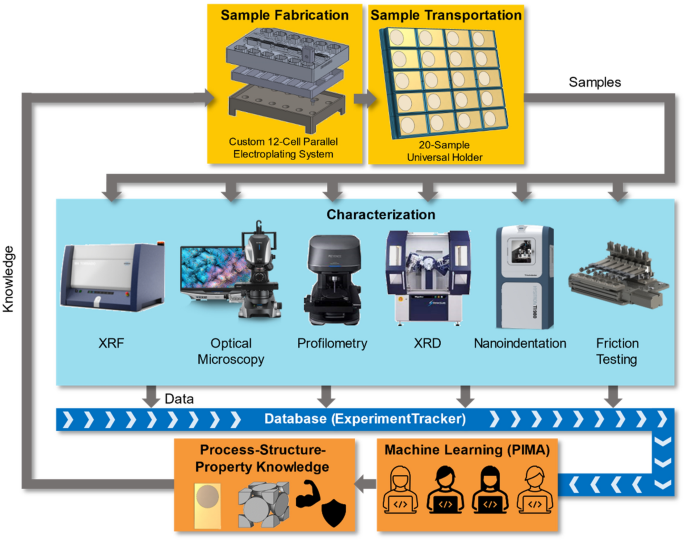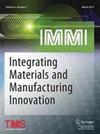A Workflow for Accelerating Multimodal Data Collection for Electrodeposited Films
IF 2.5
3区 材料科学
Q3 ENGINEERING, MANUFACTURING
Integrating Materials and Manufacturing Innovation
Pub Date : 2023-10-26
DOI:10.1007/s40192-023-00315-5
引用次数: 0
Abstract
Abstract Future machine learning strategies for materials process optimization will likely replace human capital-intensive artisan research with autonomous and/or accelerated approaches. Such automation enables accelerated multimodal characterization that simultaneously minimizes human errors, lowers costs, enhances statistical sampling, and allows scientists to allocate their time to critical thinking instead of repetitive manual tasks. Previous acceleration efforts to synthesize and evaluate materials have often employed elaborate robotic self-driving laboratories or used specialized strategies that are difficult to generalize. Herein we describe an implemented workflow for accelerating the multimodal characterization of a combinatorial set of 915 electroplated Ni and Ni–Fe thin films resulting in a data cube with over 160,000 individual data files. Our acceleration strategies do not require manufacturing-scale resources and are thus amenable to typical materials research facilities in academic, government, or commercial laboratories. The workflow demonstrated the acceleration of six characterization modalities: optical microscopy, laser profilometry, X-ray diffraction, X-ray fluorescence, nanoindentation, and tribological (friction and wear) testing, each with speedup factors ranging from 13–46x. In addition, automated data upload to a repository using FAIR data principles was accelerated by 64x.

加速电沉积薄膜多模态数据采集的工作流程
未来用于材料工艺优化的机器学习策略可能会用自主和/或加速的方法取代人力资本密集型的工匠研究。这种自动化能够加速多模态表征,同时最大限度地减少人为错误,降低成本,增强统计抽样,并允许科学家将时间分配给批判性思维,而不是重复的手动任务。以前合成和评估材料的加速工作通常采用复杂的机器人自动驾驶实验室,或者使用难以概括的专门策略。本文描述了一种实现的工作流程,用于加速915电镀Ni和Ni - fe薄膜组合集的多模态表征,从而产生具有超过160,000个单独数据文件的数据立方体。我们的加速策略不需要制造规模的资源,因此适用于学术、政府或商业实验室的典型材料研究设施。该工作流程证明了六种表征模式的加速:光学显微镜、激光轮廓测量、x射线衍射、x射线荧光、纳米压痕和摩擦学(摩擦和磨损)测试,每种模式的加速系数都在13 - 46倍之间。此外,使用FAIR数据原则将自动数据上传到存储库的速度提高了64倍。
本文章由计算机程序翻译,如有差异,请以英文原文为准。
求助全文
约1分钟内获得全文
求助全文
来源期刊

Integrating Materials and Manufacturing Innovation
Engineering-Industrial and Manufacturing Engineering
CiteScore
5.30
自引率
9.10%
发文量
42
审稿时长
39 days
期刊介绍:
The journal will publish: Research that supports building a model-based definition of materials and processes that is compatible with model-based engineering design processes and multidisciplinary design optimization; Descriptions of novel experimental or computational tools or data analysis techniques, and their application, that are to be used for ICME; Best practices in verification and validation of computational tools, sensitivity analysis, uncertainty quantification, and data management, as well as standards and protocols for software integration and exchange of data; In-depth descriptions of data, databases, and database tools; Detailed case studies on efforts, and their impact, that integrate experiment and computation to solve an enduring engineering problem in materials and manufacturing.
 求助内容:
求助内容: 应助结果提醒方式:
应助结果提醒方式:


